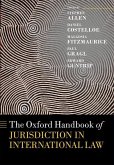The Oxford Handbook of Law and Politics
Herausgeber: Whittington, Keith E.; Caldeira, Gregory A.; Kelemen, R. Daniel
The Oxford Handbook of Law and Politics
Herausgeber: Whittington, Keith E.; Caldeira, Gregory A.; Kelemen, R. Daniel
- Broschiertes Buch
- Merkliste
- Auf die Merkliste
- Bewerten Bewerten
- Teilen
- Produkt teilen
- Produkterinnerung
- Produkterinnerung
The Oxford Handbooks of Political Science are the essential guide to the state of political science today. With engaging contributions from major international scholars, The Oxford Handbook of Law and Politics provides the key point of reference for anyone working on the interception between law and political science.
Andere Kunden interessierten sich auch für
![Interpretations of the United Nations Convention on the Law of the Sea by International Courts and Tribunals Interpretations of the United Nations Convention on the Law of the Sea by International Courts and Tribunals]() Interpretations of the United Nations Convention on the Law of the Sea by International Courts and Tribunals147,99 €
Interpretations of the United Nations Convention on the Law of the Sea by International Courts and Tribunals147,99 €![The Oxford Handbook of International Tax Law The Oxford Handbook of International Tax Law]() The Oxford Handbook of International Tax Law225,99 €
The Oxford Handbook of International Tax Law225,99 €![The Oxford Handbook of International Law in Europe The Oxford Handbook of International Law in Europe]() Anne Van AakenThe Oxford Handbook of International Law in Europe228,99 €
Anne Van AakenThe Oxford Handbook of International Law in Europe228,99 €![The Oxford Handbook of Jurisdiction in International Law The Oxford Handbook of Jurisdiction in International Law]() The Oxford Handbook of Jurisdiction in International Law222,99 €
The Oxford Handbook of Jurisdiction in International Law222,99 €![Oxford Handbook of the Theory of International Law Oxford Handbook of the Theory of International Law]() Anne OrfordOxford Handbook of the Theory of International Law293,99 €
Anne OrfordOxford Handbook of the Theory of International Law293,99 €![The Oxford Handbook of U. S. Health Law The Oxford Handbook of U. S. Health Law]() The Oxford Handbook of U. S. Health Law275,99 €
The Oxford Handbook of U. S. Health Law275,99 €![The Oxford Handbook of Children and the Law The Oxford Handbook of Children and the Law]() The Oxford Handbook of Children and the Law257,99 €
The Oxford Handbook of Children and the Law257,99 €-
-
-
The Oxford Handbooks of Political Science are the essential guide to the state of political science today. With engaging contributions from major international scholars, The Oxford Handbook of Law and Politics provides the key point of reference for anyone working on the interception between law and political science.
Hinweis: Dieser Artikel kann nur an eine deutsche Lieferadresse ausgeliefert werden.
Hinweis: Dieser Artikel kann nur an eine deutsche Lieferadresse ausgeliefert werden.
Produktdetails
- Produktdetails
- Verlag: OUP UK
- Seitenzahl: 828
- Erscheinungstermin: 1. August 2010
- Englisch
- Abmessung: 244mm x 170mm x 44mm
- Gewicht: 1400g
- ISBN-13: 9780199585571
- ISBN-10: 0199585571
- Artikelnr.: 29729607
- Herstellerkennzeichnung
- Produktsicherheitsverantwortliche/r
- Europaallee 1
- 36244 Bad Hersfeld
- gpsr@libri.de
- Verlag: OUP UK
- Seitenzahl: 828
- Erscheinungstermin: 1. August 2010
- Englisch
- Abmessung: 244mm x 170mm x 44mm
- Gewicht: 1400g
- ISBN-13: 9780199585571
- ISBN-10: 0199585571
- Artikelnr.: 29729607
- Herstellerkennzeichnung
- Produktsicherheitsverantwortliche/r
- Europaallee 1
- 36244 Bad Hersfeld
- gpsr@libri.de
Keith E. Whittington is the William Nelson Cromwell Professor of Politics at Princeton University. He is the author of Political Foundations of Judicial Supremacy; Constitutional Interpretation; and Constitutional Construction. He pursues research in the fields of constitutional theory, American political and constitutional development, and American political institutions. R. Daniel Kelemen is Associate Professor of Political Science at Rutgers University. He is the author of The Rules of Federalism. He pursues research in the fields of the politics of the European Union, comparative political economy, and federalism and environmental policy. Gregory A. Caldeira is Distinguished University Professor of Political Science and Law at Ohio State University. He pursues research and teaching in the fields of judicial processes in the United States and Europe, organized interests, and American political institutions. His publications on these subjects have appeared in such journals as the American Political Science Review, American Journal of Political Science, Journal of Politics , and the British Journal of Political Science. He is former chair of the Law and Courts Section of the American Political Science Association, former editor of the American Journal of Political Science, and former president of the Midwest Political Science Association.
* Part I: Introduction
* Part II: Approaches
* 1: Jeffrey Segal: Judicial Behavior
* 2: Pablo Spiller and Rafael Gely: Strategic Action
* 3: Rogers Smith: Historical Institutionalism
* 4: Malcolm Feeley: Sociological Perspectives
* Part III: Comparative Judicial Politics
* 5: Rick Messick and Matthew Stephenson: Rule of Law, Courts, and
Economic Development
* 6: Rebecca Chavez: Rule of Law and Courts in Democratizing Regimes
* 7: Thomas Ginsburg: The Global Spread of Constitutional Review
* 8: Georg Vanberg: Establishing and Maintaining Judicial Independence
* 9: Ran Hirschl: Judicialization of Politics?
* 10: Daniel Halberstam: Federalism
* 11: Kim Scheppele: Emergency and Prerogative Powers
* Part IV: International and Supranational Law
* 12: Beth Simmons: International Law
* 13: Karen Alter: The European Court of Justice and European Legal
Integration
* 14: Gary Bass: War Crimes Tribunals
* 15: Bryant Garth: The Globalization of the Law
* Part V: Forms of Legal Order
* 16: Ugo Mattei and Luca Pes: Civil Law and Common Law: Toward
Convergence?
* 17: Keith Whittington: Constitutionalism
* 18: Mark Graber: Constitutional Law
* 19: Richard Pildes: Legal Structures of Democracy
* 20: Daniel Rodriguez: Administrative Law
* 21: Elizabeth Garrett: Legislation and Statutory Interpretation
* 22: Christine Harrington: Informal and Private Dispute Resolution
* Part VI: Sources of Law and Theories of Jurisprudence
* 23: Jules Coleman: Positivism
* 24: Robert George: Natural Law
* 25: Matthew Kramer: Rights Liberalism
* 26: Frederick Schauer: Formalism and Its Discontents
* 27: Judith Baer: Feminist Theory
* 28: Sheila Foster and Robin Lenhardt: Race and Legal Theory
* Part VII: The American Judicial Context
* 29: David Yalof: Filling the Bench
* 30: Lee Epstein: The U.S. Supreme Court
* 31: Susan Haire: Relations Among Courts
* 32: Michael McCann: Litigation and the Mobilization of Law
* 33: Richard Abel: Legal Profession
* 34: Gregory A. Caldeira: The Public and the Courts
* Part VIII: The Political and Policy Environment of Courts in the
United States
* 35: Frank Cross: Judicial Independence
* 36: Susan Rose-Ackerman: Law and Regulation
* 37: Charles Epp: Law as an Instrument of Social Reform
* 38: Wesley Skogan: Criminal Justice and Police
* 39: Julie Novkov: Law and Political Ideologies
* 40: Howard Gillman: Courts and Political Partisan Regimes
* 41: Scott Barclay and Susan Silbey: Legal Consciousness
* Part IX: Interdisciplinary Approaches to Law and Politics
* 42: Lynn Mathers: Law and Society
* 43: Lewis Kornhauser: Law and Economics
* 44: Tom Tyler: Law and Psychology
* 45: William MacNeil: Law and Literature
* 46: Christopher Tomlins: Law and History
* Part X: Old and New
* Part II: Approaches
* 1: Jeffrey Segal: Judicial Behavior
* 2: Pablo Spiller and Rafael Gely: Strategic Action
* 3: Rogers Smith: Historical Institutionalism
* 4: Malcolm Feeley: Sociological Perspectives
* Part III: Comparative Judicial Politics
* 5: Rick Messick and Matthew Stephenson: Rule of Law, Courts, and
Economic Development
* 6: Rebecca Chavez: Rule of Law and Courts in Democratizing Regimes
* 7: Thomas Ginsburg: The Global Spread of Constitutional Review
* 8: Georg Vanberg: Establishing and Maintaining Judicial Independence
* 9: Ran Hirschl: Judicialization of Politics?
* 10: Daniel Halberstam: Federalism
* 11: Kim Scheppele: Emergency and Prerogative Powers
* Part IV: International and Supranational Law
* 12: Beth Simmons: International Law
* 13: Karen Alter: The European Court of Justice and European Legal
Integration
* 14: Gary Bass: War Crimes Tribunals
* 15: Bryant Garth: The Globalization of the Law
* Part V: Forms of Legal Order
* 16: Ugo Mattei and Luca Pes: Civil Law and Common Law: Toward
Convergence?
* 17: Keith Whittington: Constitutionalism
* 18: Mark Graber: Constitutional Law
* 19: Richard Pildes: Legal Structures of Democracy
* 20: Daniel Rodriguez: Administrative Law
* 21: Elizabeth Garrett: Legislation and Statutory Interpretation
* 22: Christine Harrington: Informal and Private Dispute Resolution
* Part VI: Sources of Law and Theories of Jurisprudence
* 23: Jules Coleman: Positivism
* 24: Robert George: Natural Law
* 25: Matthew Kramer: Rights Liberalism
* 26: Frederick Schauer: Formalism and Its Discontents
* 27: Judith Baer: Feminist Theory
* 28: Sheila Foster and Robin Lenhardt: Race and Legal Theory
* Part VII: The American Judicial Context
* 29: David Yalof: Filling the Bench
* 30: Lee Epstein: The U.S. Supreme Court
* 31: Susan Haire: Relations Among Courts
* 32: Michael McCann: Litigation and the Mobilization of Law
* 33: Richard Abel: Legal Profession
* 34: Gregory A. Caldeira: The Public and the Courts
* Part VIII: The Political and Policy Environment of Courts in the
United States
* 35: Frank Cross: Judicial Independence
* 36: Susan Rose-Ackerman: Law and Regulation
* 37: Charles Epp: Law as an Instrument of Social Reform
* 38: Wesley Skogan: Criminal Justice and Police
* 39: Julie Novkov: Law and Political Ideologies
* 40: Howard Gillman: Courts and Political Partisan Regimes
* 41: Scott Barclay and Susan Silbey: Legal Consciousness
* Part IX: Interdisciplinary Approaches to Law and Politics
* 42: Lynn Mathers: Law and Society
* 43: Lewis Kornhauser: Law and Economics
* 44: Tom Tyler: Law and Psychology
* 45: William MacNeil: Law and Literature
* 46: Christopher Tomlins: Law and History
* Part X: Old and New
* Part I: Introduction
* Part II: Approaches
* 1: Jeffrey Segal: Judicial Behavior
* 2: Pablo Spiller and Rafael Gely: Strategic Action
* 3: Rogers Smith: Historical Institutionalism
* 4: Malcolm Feeley: Sociological Perspectives
* Part III: Comparative Judicial Politics
* 5: Rick Messick and Matthew Stephenson: Rule of Law, Courts, and
Economic Development
* 6: Rebecca Chavez: Rule of Law and Courts in Democratizing Regimes
* 7: Thomas Ginsburg: The Global Spread of Constitutional Review
* 8: Georg Vanberg: Establishing and Maintaining Judicial Independence
* 9: Ran Hirschl: Judicialization of Politics?
* 10: Daniel Halberstam: Federalism
* 11: Kim Scheppele: Emergency and Prerogative Powers
* Part IV: International and Supranational Law
* 12: Beth Simmons: International Law
* 13: Karen Alter: The European Court of Justice and European Legal
Integration
* 14: Gary Bass: War Crimes Tribunals
* 15: Bryant Garth: The Globalization of the Law
* Part V: Forms of Legal Order
* 16: Ugo Mattei and Luca Pes: Civil Law and Common Law: Toward
Convergence?
* 17: Keith Whittington: Constitutionalism
* 18: Mark Graber: Constitutional Law
* 19: Richard Pildes: Legal Structures of Democracy
* 20: Daniel Rodriguez: Administrative Law
* 21: Elizabeth Garrett: Legislation and Statutory Interpretation
* 22: Christine Harrington: Informal and Private Dispute Resolution
* Part VI: Sources of Law and Theories of Jurisprudence
* 23: Jules Coleman: Positivism
* 24: Robert George: Natural Law
* 25: Matthew Kramer: Rights Liberalism
* 26: Frederick Schauer: Formalism and Its Discontents
* 27: Judith Baer: Feminist Theory
* 28: Sheila Foster and Robin Lenhardt: Race and Legal Theory
* Part VII: The American Judicial Context
* 29: David Yalof: Filling the Bench
* 30: Lee Epstein: The U.S. Supreme Court
* 31: Susan Haire: Relations Among Courts
* 32: Michael McCann: Litigation and the Mobilization of Law
* 33: Richard Abel: Legal Profession
* 34: Gregory A. Caldeira: The Public and the Courts
* Part VIII: The Political and Policy Environment of Courts in the
United States
* 35: Frank Cross: Judicial Independence
* 36: Susan Rose-Ackerman: Law and Regulation
* 37: Charles Epp: Law as an Instrument of Social Reform
* 38: Wesley Skogan: Criminal Justice and Police
* 39: Julie Novkov: Law and Political Ideologies
* 40: Howard Gillman: Courts and Political Partisan Regimes
* 41: Scott Barclay and Susan Silbey: Legal Consciousness
* Part IX: Interdisciplinary Approaches to Law and Politics
* 42: Lynn Mathers: Law and Society
* 43: Lewis Kornhauser: Law and Economics
* 44: Tom Tyler: Law and Psychology
* 45: William MacNeil: Law and Literature
* 46: Christopher Tomlins: Law and History
* Part X: Old and New
* Part II: Approaches
* 1: Jeffrey Segal: Judicial Behavior
* 2: Pablo Spiller and Rafael Gely: Strategic Action
* 3: Rogers Smith: Historical Institutionalism
* 4: Malcolm Feeley: Sociological Perspectives
* Part III: Comparative Judicial Politics
* 5: Rick Messick and Matthew Stephenson: Rule of Law, Courts, and
Economic Development
* 6: Rebecca Chavez: Rule of Law and Courts in Democratizing Regimes
* 7: Thomas Ginsburg: The Global Spread of Constitutional Review
* 8: Georg Vanberg: Establishing and Maintaining Judicial Independence
* 9: Ran Hirschl: Judicialization of Politics?
* 10: Daniel Halberstam: Federalism
* 11: Kim Scheppele: Emergency and Prerogative Powers
* Part IV: International and Supranational Law
* 12: Beth Simmons: International Law
* 13: Karen Alter: The European Court of Justice and European Legal
Integration
* 14: Gary Bass: War Crimes Tribunals
* 15: Bryant Garth: The Globalization of the Law
* Part V: Forms of Legal Order
* 16: Ugo Mattei and Luca Pes: Civil Law and Common Law: Toward
Convergence?
* 17: Keith Whittington: Constitutionalism
* 18: Mark Graber: Constitutional Law
* 19: Richard Pildes: Legal Structures of Democracy
* 20: Daniel Rodriguez: Administrative Law
* 21: Elizabeth Garrett: Legislation and Statutory Interpretation
* 22: Christine Harrington: Informal and Private Dispute Resolution
* Part VI: Sources of Law and Theories of Jurisprudence
* 23: Jules Coleman: Positivism
* 24: Robert George: Natural Law
* 25: Matthew Kramer: Rights Liberalism
* 26: Frederick Schauer: Formalism and Its Discontents
* 27: Judith Baer: Feminist Theory
* 28: Sheila Foster and Robin Lenhardt: Race and Legal Theory
* Part VII: The American Judicial Context
* 29: David Yalof: Filling the Bench
* 30: Lee Epstein: The U.S. Supreme Court
* 31: Susan Haire: Relations Among Courts
* 32: Michael McCann: Litigation and the Mobilization of Law
* 33: Richard Abel: Legal Profession
* 34: Gregory A. Caldeira: The Public and the Courts
* Part VIII: The Political and Policy Environment of Courts in the
United States
* 35: Frank Cross: Judicial Independence
* 36: Susan Rose-Ackerman: Law and Regulation
* 37: Charles Epp: Law as an Instrument of Social Reform
* 38: Wesley Skogan: Criminal Justice and Police
* 39: Julie Novkov: Law and Political Ideologies
* 40: Howard Gillman: Courts and Political Partisan Regimes
* 41: Scott Barclay and Susan Silbey: Legal Consciousness
* Part IX: Interdisciplinary Approaches to Law and Politics
* 42: Lynn Mathers: Law and Society
* 43: Lewis Kornhauser: Law and Economics
* 44: Tom Tyler: Law and Psychology
* 45: William MacNeil: Law and Literature
* 46: Christopher Tomlins: Law and History
* Part X: Old and New








